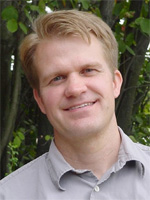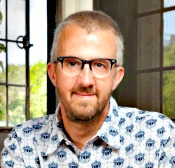 Bryan Ballif, Associate Professor of Biology
Bryan Ballif, Associate Professor of Biology Tuesday, March 10, 2015 at 5:00 p.m.
Waterman Memorial Lounge
The College of Arts and Sciences Dean’s Lecture: Grandma Eloise’s Toy Box and the Discovery of Four Novel Blood Types
 Bryan Ballif, Associate Professor of Biology
Bryan Ballif, Associate Professor of Biology
Tuesday, March 10, 2015 at 5:00 p.m.
Waterman Memorial Lounge
The College of Arts and Sciences Dean’s Lecture: Grandma Eloise’s Toy Box and the Discovery of Four Novel Blood Types
You may know your ABO blood type. You may even know if you are Rhesus (Rh) positive or negative. However, do you know if you are positive or negative for the more than thirty additional blood types? While rare, these blood types can inflict life-threatening complications for transfusion patients or for fetuses during pregnancy. Detecting these rare blood types can be very challenging, particularly because the causes of several have remained mysterious for decades. Professor Ballif will describe his primary role in an international collaboration that has solved some of these riddles by providing the molecular bases for four rare blood group systems.
Associate Professor of Biology, Bryan Ballif, is a cellular biochemist, developmental biologist and protein mass spectrometrist. After degrees in Microbiology and Biochemistry he received a Ph.D. in Cell and Developmental Biology from Harvard. Following postdoctoral research at the Fred Hutchinson Cancer Research Center and again at Harvard, he joined UVM’s Department of Biology in 2006 where he teaches and continues his studies of cellular signaling in cell migration and proliferation. Additionally, Professor Ballif’s research spans multiple biological disciplines as he is sought out to collaborate with many local to international researchers. His research is featured in 63 journal articles.
 Mark Usher, Professor of Classics
Mark Usher, Professor of Classics
Tuesday, April 7, 2015 at 5:00 p.m.
Waterman Memorial Lounge
The College of Arts and Sciences Full Professor Lecture: Sustainability, Complex Systems, and the Greeks
Proponents of “sustainability” and the field of Complex Systems tend to present their ideas and prescriptions as new and innovative. To the extent that sustainability studies and complexity theory utilize new technologies, mathematical advances, and scientific discoveries in their pursuits, they are indeed new, innovative, and important. However, the fundamental tenets of sustainability—living within limits, imposing/encouraging limits and stewardship through values training, social pressures, incentives, and civic policies—these are some of the hallmarks of ancient Greek culture and thought. As for systems thinking—i.e., the proposition that no phenomenon is a discrete, isolated entity or event, but must be viewed as part of complex, relational wholes with physical, moral, social, and noetic dimensions—this is exactly the philosophic undertaking of the Presocratics and of the poet Hesiod, and, in their wake, of Plato and Aristotle, and, later, the Stoics and Epicureans.
This lecture is the first installment of Professor Usher’s new book project in which he traces the trajectory of modern ideas about sustainability and complexity theory back to the ancient Greeks. Its aim is 1) to invigorate and inform current thinking in these areas, and 2) to underscore the extent of the Greco-Roman contribution to these topics of contemporary, global concern.
M. D. Usher is Chair of the Classics Department. He has taught at UVM since 2000, and is an undergraduate alumnus. In addition to academic books and articles on Greek and Latin literature, he has published three books for children, original poetry and translations, and two opera libretti. The impetus for this new project on sustainability and complex systems stems from his training as a Classicist, his appointment as a Sustainability Faculty Fellow for 2010-11, and twelve years of hands-on experience in farming. (He and his wife built and operate Works & Days Farm, a small, diversified farmstead in Shoreham that produces lamb, poultry, eggs, maple syrup, and honey on 125 acres.)
******
Please note: All lecture speakers, topics, start times, and locations are subject to change.